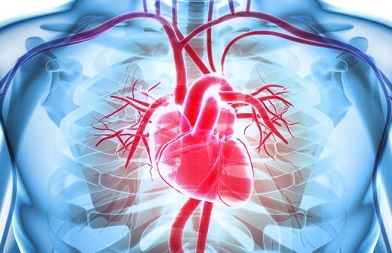Nikhil Prasad Fact checked by:Thailand Medical News Team Jun 13, 2024 10 months, 1 week, 6 days, 9 hours, 22 minutes ago
Cardiology Updates: Understanding the critical roles played by various proteins in our body can unveil the mysteries behind many diseases. One such essential protein is the Valosin-Containing Protein (VCP). A recent study that is covered in this
Cardiology Updates news report, highlights the dramatic impact of VCP deficiency on heart health, revealing how its absence can lead to severe heart failure and premature death.
 Valosin-Containing Protein Deficiency: The Hidden Culprit
Valosin-Containing Protein Deficiency: The Hidden Culprit
Behind Heart Failure
What is VCP?
VCP, also known as p97 in humans, is a protein found in almost all cell types. It plays a crucial role in several cellular processes, including protein degradation, stress response, and maintaining cell health. In the heart, VCP is vital for maintaining proper function and structure.
The Study: Unveiling VCP's Role
Researchers from Georgia State University and the University of Arizona conducted a detailed study to understand VCP's role in heart health. They created a special mouse model where Valosin-Containing Protein was specifically knocked out in heart cells to observe the effects.
The Experiment
-Creating the Model: Scientists developed a cardiac-specific VCP knockout (KO) mouse model. This means they genetically engineered mice to lack VCP in their heart cells.
-Observing the Effects: They compared these KO mice to normal mice (control group) to see how the absence of Valosin-Containing Protein affected their heart function and overall health.
Key Findings
The study revealed some startling results:
-Early Death
The KO mice showed a significant reduction in lifespan, with all of them dying before reaching one year of age. This premature mortality was directly linked to the absence of VCP in their heart cells.
-Heart Function: Despite being born healthy, these mice progressively developed severe heart failure. This suggests that Valosin-Containing Protein is crucial for maintaining long-term heart health.
Molecular Changes
-mTOR Pathway: Early on, the absence of VCP led to the selective activation of a cellular pathway known as mTORC1. This pathway is involved in cell growth and metabolism. However, mTORC2, another component of the same pathway crucial for cell survival, remained unchanged initially.
-Protein Phosphatase 1 (PP1): As the mice aged, there was a significant increase in PP1 levels, a protein that dephosphorylates other proteins, effectively turning them off. This change was accompanied by a drastic reduction in a key survival signal in heart cells, p-AKT473.
How Does This Lead to Heart Failu
re?
The study's timeline showed that:
-Initial Compensatory Mechanisms: Initially, the heart tries to compensate for the loss of VCP by activating mTORC1, attempting to maintain function. This early activation might help delay the onset of symptoms but is not sustainable.
-Progressive Decline: Over time, the continuous suppression of Valosin-Containing Protein overwhelms these compensatory mechanisms. The increase in PP1 and decrease in p-AKT473 lead to severe heart dysfunction, manifesting as heart failure and eventually death.
Implications for Human Health
These findings are not just relevant to mice. VCP is highly conserved across species, meaning it performs similar functions in humans. Mutations or deficiencies in VCP are associated with various human diseases, including heart conditions.
The Broader Impact: VCP in Human Diseases
-Genetic Disorders: Mutations in the VCP gene are linked to a range of genetic disorders, such as inclusion body myopathy, Paget's disease of bone, and frontotemporal dementia (IBMPFD).
-Cardiomyopathy: Specific mutations in VCP are known to cause dilated cardiomyopathy, a condition where the heart becomes enlarged and cannot pump blood effectively.
Future Directions
Understanding VCP's role opens new avenues for research and potential therapies:
-Targeting PP1: Developing drugs that modulate PP1 activity could help manage heart failure in patients with Valosin-Containing Protein deficiencies. By reducing PP1 activity, it might be possible to restore the balance and improve heart function.
-Gene Therapy: Correcting Valosin-Containing Protein mutations through gene therapy might offer a long-term solution for affected individuals. This approach aims to fix the root cause of the deficiency rather than just managing the symptoms.
Conclusion
This study underscores the importance of Valosin-Containing Protein in maintaining heart health. The progressive heart failure observed in VCP-deficient mice highlights potential mechanisms that could be at play in human heart diseases. Ongoing research in this field holds promise for developing new treatments that could improve the lives of those affected by similar conditions.
Acknowledging the Complexity
While the study offers significant insights, it also acknowledges that the relationship between VCP and heart health is complex. Further research is needed to fully understand all the mechanisms involved and to develop effective therapies.
Final Thoughts
The discovery of VCP's crucial role in heart health opens a new chapter in cardiovascular research. It provides a foundation for future studies and potential treatments that could one day benefit millions of people worldwide. Understanding and targeting the molecular pathways involved in heart diseases is key to developing effective treatments and improving patient outcomes.
The study findings were published in the peer reviewed International Journal of Molecular Sciences.
https://www.mdpi.com/1422-0067/25/12/6445
Thailand
Medical News is currently working with two team of researchers in identifying natural phytochemicals that can upregulate Valosin-Containing Protein in the heart tissues.
For the latest
Cardiology Updates, keep on logging to Thailand Medical News.
Read Also:
https://www.thailandmedical.news/news/study-identifies-key-genes-in-covid-19-associated-heart-failure-with-two-critical-gene-pygm-and-blm-identified-as-potential-intervention-targets
https://www.thailandmedical.news/news/alarming-study-findings-shows-that-sars-cov-2-disrupts-heart-muscle-contraction,-often-leading-to-heart-failure
https://www.thailandmedical.news/news/ai-in-medicine-university-of-glasgow-develops-ai-platform-that-analyzes-echocardiograms-rapidly-to-detect-heart-failure
